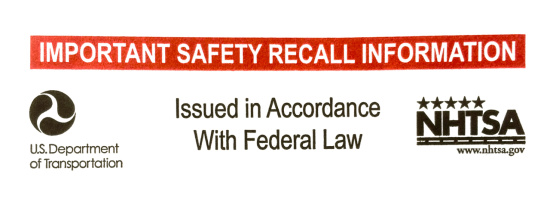Last year we bought a new (new to us) used Honda Fit for my wife Amy. She loves it. It’s peppy, gets amazing gas mileage and seats 5 comfortably. We have had no complaints. Then, earlier this week, a note came in the mail from Honda: “IMPORTANT: SAFETY RECALL NOTICE.”
I have gotten recall notices before. Most of us have. Generally they are no big deal, some small defect that needs to be fixed. This one, however, raised the hair on the back of my neck. The notice started off with these words in bold: “The defect in these vehicles could kill or injure you or other people in your vehicle.” Then it continues: “Specifically, in some vehicles the driver’s front airbag inflator could produce excessive internal pressure upon deployment. If an affected airbag deploys, the increased internal pressure may cause the inflator to rupture (break apart) and deploy abnormally. In the event of an inflator rupture, metal fragments could pass through the airbag cushion material possibly causing serious injury or fatality to you or others in the vehicle.”
Scary, right? But at this point it was just theoretical until I continue to read this notice: “Past ruptures like this have killed and injured vehicle drivers.”
People HAVE been killed? How many? I then went into full research mode, poring over everything I could find online. The exact numbers are sketchy. The truth is, officials are still piecing together facts from past fatal wrecks to determine the statistics, but as best as I can tell, it looks like around 10 people have been killed by these types of faulty airbag deployments and over 100 have been seriously injured. These numbers vary quite a bit, depending on the source. Suffice it to say, I took the warning very seriously, especially knowing that an airbag can go off even in a fairly low-speed fender bender.
I was ready to rush down to our local Honda dealer to get this fixed right way until I read the next line: “The remedy parts needed to conduct driver’s airbag inflator recalls will become available in the Summer of 2016. Honda will send you another letter when the parts become available to repair your vehicle.” WTF?!?
OK, so in my mind, until sometime this summer, my wife will be driving around town with the equivalent of a loaded gun pointed at her face. I noticed a line in the recall notice that said, “Feel free to discuss your specific needs and concerns with your dealer, including the provision of, or reimbursement for, temporary alternative transportation.” Alternative transportation? Would that mean a rental car? It turns out the answer is … yes.
I contacted Mid-City Motor World, our local Honda dealer, and expressed my concerns about what could be done until the parts were available for the repair. They told me that Honda would pay for a rental car until the defect could be corrected. They just needed the VIN from the car. A few hours later, after they verified that, indeed, our Fit was part of the recall, they said we were approved. I went down there, signed a couple of documents, and they gave me a voucher for a rental from Hertz. All I need to do is give Hertz a $50 deposit and return there each month to resign the documents.
That is it! Later this afternoon, we will be picking up our rental. OK, I understand that the odds of being killed by a faulty airbag are small, but why risk it when a remedy is available, right? I give my personal kudos to Honda, and Mid-City Motor World for being so accommodating.
So you may be asking yourself, “Why is it going to take so long for replacing parts to become available?” It is because this is part of the biggest safety recall in US history. This recall has just been expanded to nearly 35 million vehicles by nearly every auto manufacturer. This includes BMW, Chrysler, Ford, GM (Chevrolet, GMC, Pontiac, Saturn, Saab), Mazda, Mercedes-Benz, Mitsubishi, Nissan, Subaru, Toyota, and Volkswagen. (See a compete list of vehicles, makes, models and years at NHTSA.gov).
This whole recall revolves around the Japanese auto parts manufacturer Takata. They have been making airbags for many automakers for years. What is most troubling though is that there has actually been a suspected problem for many of those years. Many have asked why it has taken so long for this massive recall to be enacted? At first, Takata insisted that the issue was only limited to areas with high humidity, which affecting the propellant. However, there have be several fatalities in states that were not on the original “high-humidity” list. The recall has now be expanded much further than originally planned and may even go further.
What to do if you have a vehicle on the recall list: First, go to this safecar.gov link and enter your car’s VIN. It will tell you the status of your particular vehicle.
Do automakers other than Honda offer a free rental car? Good question. I don’t know. However, if your car is on the list, it can’t hurt to contact your local dealer about it. They may offer a rental but are not publicizing it.

CLICK TO MANAGE